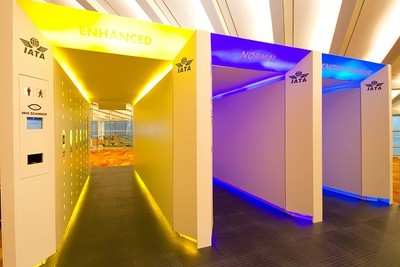But Says System Needs Improvement For Travelers And
Shippers
The International Air Transport Association (IATA) urged
governments and other aviation stakeholders to join airlines in a
partnership to improve aviation security and the experience of both
travelers and shippers. Key to this is early adoption of IATA's
Checkpoint of the Future (CoF), a supply chain approach to cargo
security, harmonization of measures among governments and constant
vigilance to new threats.

"With a decade of experience in the post 9/11 world, it is time
for a holistic review of what has been created. There are a lot of
things we do right and there is lot that could be improved. I am
convinced that by working in partnership we can find a better way.
Security is a top priority for everyone associated with the
aviation industry. We must find ways to improve both the security
of the system and the satisfaction of those who use it," said Tony
Tyler (pictured), IATA's Director General and CEO. Tyler's comments
were made in an address to the AVSEC World Conference and
Exhibition which has gathered nearly 500 industry leaders in
Amsterdam.
IATA is calling for an overhaul of airport security screening
and urging early adoption of the principles behind its Checkpoint
of the Future vision. The CoF introduces a risk-based approach
supported by advanced technology to allow passengers to move
through the checkpoint without stopping, unpacking or
disrobing.
"Today's security checkpoint was developed in the 1970's when
hijackers carrying metal weapons were the threat. It is a 40
year-old-concept that needs to fundamentally change. We have added
layers of process in response to threats and events but we have not
made it any more intelligent because we do not use the information
that is collected on passengers to power a risk-based approach. A
one-size-fits-all model is applied to every passenger. Their
experience is often unpleasant, intrusive, inefficient and time
consuming. For the billions of dollars that we spend, we could do a
lot better," said Tyler.
IATA "Checkpoint Of The Future"

CoF's risk-based approach would divide passenger screening into
three categories (1) normal, (2) enhanced and (3) "known traveler".
This is based on data already being collected on passengers for
customs and immigrations processes such as data stored in the
Passenger Name Record, or Advanced Passenger Information, which is
provided to governments via travel documents. There would be no
profiling based on religious or ethnic grounds. Access to the
expedited "known traveler" lane would be reserved for those
travelers who voluntarily provide background data to governments
through "known traveler" programs such as those being tested in the
US, Canada and elsewhere. In all categories travelers would be
screened to a baseline level.
The CoF long-term vision anticipates advanced screening
technology that would enable passengers to be screened with their
bags without stopping, removing clothing or unpacking. Such
equipment is expected to be fully available within seven years. In
the interim, parts of the CoF vision could be implemented. "There
is no need to wait for all the technology to be available to
eliminate some of the hassle while improving security. As known
traveler programs are developed, they can be progressively
incorporated into the process. And re-purposing of some screening
equipment can help with improving efficiencies. With traveler
numbers expected to reach 3.5 billion by 2015-up 700 million from
today-we need to get started now," said Tyler.
In the aftermath of last year's incident concerning printer
cartridges being shipped from Yemen, governments continue to look
for ways to further tighten air cargo security. "The future of air
cargo security is a multi-layered approach involving the whole
supply chain and including both advanced electronic information and
physical screening. But we don't want to see 100% screening at
airports, which would grind global commerce to a halt," said Tyler.
This year airlines are expected to carry some 46 million tonnes of
air cargo which will account for about 35% of the total value of
goods traded internationally.

"Aviation is a global industry that is built on global
standards. That is how aviation became the safest way to travel.
And it is the best way to make it secure," he said. Tyler also
noted IATA's opposition to the development of so-called "Red Lists"
for cargo. "Requiring certain countries to overcome extreme hurdles
to participate in global commerce is the wrong approach," he said.
But he also warned against complacency. "We must not make the
mistake of believing that technology or regulation can be a
substitute for vigilance as we strive to make air transport more
secure. Each has an important role, but over-reliance on either
breeds complacency-which is a step in the wrong direction. We must
continue to be vigilant. That means working in partnership with
governments and the value chain to anticipate and prepare for the
next generation of threats in a way that is harmonized among
states," he said.
IATA reiterated the need for governments to bear the cost of
security which has risen to $7.4 billion annually. "The threats
that we face concern national security. As with any other national
security issue, the cost should be borne by national governments,"
said Tyler.
 ANN's Daily Aero-Linx (04.16.24)
ANN's Daily Aero-Linx (04.16.24) Aero-News: Quote of the Day (04.16.24)
Aero-News: Quote of the Day (04.16.24) Airborne 04.10.24: SnF24!, A50 Heritage Reveal, HeliCycle!, Montaer MC-01
Airborne 04.10.24: SnF24!, A50 Heritage Reveal, HeliCycle!, Montaer MC-01 Airborne 04.12.24: SnF24!, G100UL Is Here, Holy Micro, Plane Tags
Airborne 04.12.24: SnF24!, G100UL Is Here, Holy Micro, Plane Tags Airborne-Flight Training 04.17.24: Feds Need Controllers, Spirit Delay, Redbird
Airborne-Flight Training 04.17.24: Feds Need Controllers, Spirit Delay, Redbird





